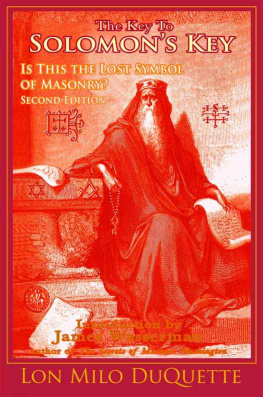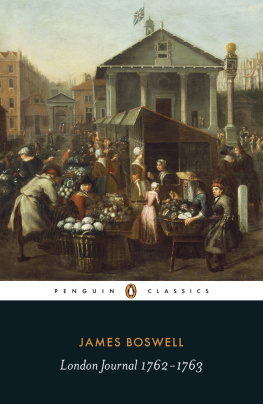Barakaldo Books 2020, all rights reserved. No part of this publication may be reproduced, stored in a retrieval system or transmitted by any means, electrical, mechanical or otherwise without the written permission of the copyright holder.
Publishers Note
Although in most cases we have retained the Authors original spelling and grammar to authentically reproduce the work of the Author and the original intent of such material, some additional notes and clarifications have been added for the modern readers benefit.
We have also made every effort to include all maps and illustrations of the original edition the limitations of formatting do not allow of including larger maps, we will upload as many of these maps as possible.
THE SIEGE OF DETROIT IN 1763
The Journal of Pontiacs Conspiracy
and
John Rutherfurds Narrative of a Captivity
EDITED BY
MILO MILTON QUAIFE
Table of Contents
Contents
Table of Contents
REQUEST FROM THE PUBLISHER
PUBLISHERS PREFACE
WHILE the publishers of the Lakeside Classics have certain self-imposed restrictions in the selection of subject matter, they do enjoy wide latitude respecting time and location within their chosen field of Americana. So it is that they were able to make an excursion two years ago into the Southeast of the eighteenth century, to return last year to the familiar Southwest of the nineteenth, and change place and period this year to the Midwest of the eighteenth.
This years Classic deals with an important event at a strategic location during an era most significant to the development of the Midwest. At this time, following the surrender of Canada in 1760, the English were taking the territory over from the French, which meant that traders and trappers would gradually be giving way to settlers and colonizers. That change was destined to have a heavy impact upon the Indians, as some of them no doubt dimly foresaw. Chief Pontiacs ability as a leader, extraordinary as it was, was not great enough to turn the irresistible forces of encroaching civilization. His attempt to do so gives us some of the most exciting and gruesome stories of the opening up of our country. That he should pick Detroit as his own scene of operations in his conspiracy to expel the British is not surprising. Detroit held, and continues to enjoy, a favored location on the water route to the West and central to what is now Ohio, Indiana and Michigan.
The Journal of Pontiacs Conspiracy itself is a vivid account of an exciting episode in the Indian Wars. Since it ends abruptly and without explanation before the end of the action, the publishers have taken the liberty to include a brief account of what happened thereafter for the benefit of readers not intimately acquainted with this period of history. The narrative of John Rutherfurds captivity, itself a good story, adds interesting details to the picture of the siege, and since it has not been readily available, it has been included in this volume.
The Editor in his Historical Introduction deals fully with the background and authorship of both the Journal of Pontiacs Conspiracy and Rutherfurds Narrative. The publishers are happy again to have Dr. Quaifes expert editorial talents at work on his forty-second Lakeside Classic. It seems particularly appropriate in that he has lived in Detroit many years and has a particular interest in and knowledge of its history. We add our thanks to the acknowledgments he makes, especially to the Burton Historical Collection of the Detroit Public Library.
The Company is happy to report completion of another successful year, especially in view of unsettled conditions in some areas of our economy. There was a shifting of our customers requirements, some needing more of our services, others less, and some using them for the first time.
Plans for expansion are being vigorously pursued. The Company was particularly pleased to reach an agreement with the National Geographic Society to print their magazine, so widely respected for its editorial excellence and outstanding quality. Production will commence in 1959. A building in Chicago is being remodeled to provide space for this work, as another already has been for our Engineering and Purchasing functions. Additional warehouse space is under construction in both Chicago and Crawfordsville to permit more efficient handling of increased tonnage of product. At Willard, Ohio, an addition has been completed and equipment is being installed to enable that plant to produce book work in addition to telephone directories. At Warsaw, Indiana, construction of a plant and a training program have been started, to utilize more of the equipment acquired last year from the Crowell-Collier Publishing Company. This overall program naturally increases considerably requirements for capital funds. To meet these a public sale of debentures was made successfully last spring.
We send this volume to our many friends among our patrons, suppliers, employees and others, believing this an appropriate form of greeting from a printer, engraver, and binder. In so doing we are most gratefully conscious that our growth and success over the years has been made possible in large part by these friends, and so resolve to explore and strive for new ways to serve and cooperate with them ever better. To you, a Merry Christmas and a Happy New Year!
The Publishers
Christmas, 1958
ILLUSTRATIONS
Major Henry Gladwin
Map of The Detroit River Area in 1763
An idealized View of Fort Detroit
Map of The War Around Lake Erie in 1763
The Pontiac Tree
Lieutenant John Rutherfurd
HISTORICAL INTRODUCTION
THE Burton Historical Collection of the Detroit Public Library contains hundreds of thousands of manuscripts. If its custodians were to be asked which one of them they would endeavor to save in the event of an overwhelming disaster they would almost certainly name a faded and mutilated record which bears the simple title Journal ou Dictation dune Conspiration. And if some wealthy private collector should seek to purchase it by offering the Library a check with the price left blank, to be filled in at its pleasure, the answer would undoubtedly be that no amount of money whatever would tempt the Library to part with it.
Yet the manuscript, which for convenience is called the Pontiac Journal (although it was not written by Pontiac nor is it his journal), was not always highly prized nor carefully guarded. On the contrary, until about the year 1832, almost seventy years after it had been written in 1763, its whereabouts and its custodian are unknown. Stories more or less legendary relate, however, that a French Canadian house in Detroit was being razed, when hidden away between the walls or in some such romantic spot the document was found. Apparently its value was recognized for someone took the trouble to preserve it. At one time Father Gabriel Richard, whose memory is still cherished in Detroit, was its guardian and he probably housed it in old St. Annes Church. Following his death in 1832 Governor Lewis Cass acquired it.
Cass was an able administrator and an avid scholar, and one might reasonably assume that the safety of the manuscript was at last assured. That it was not, was no fault of his, for on February 28, 1838 he gave it to the ten-year-old Michigan Historical Society, of which he was a leading promoter. One of the Societys most active workers was Henry Rowe Schoolcraft, whom Cass had been instrumental in bringing from his New York home to Detroit a score of years earlier. Schoolcraft became an earnest student of Indian life and lore and over a period of forty years or more he authored or edited a prodigious quantity of material dealing with the exploration and geology of the western country, and with the red race in particular.














